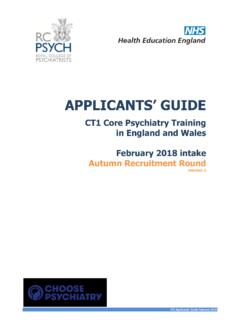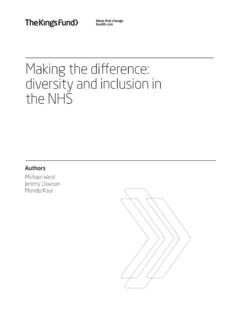Transcription of resilience questionnaire & score inc 10 tips - nwpgmd.nhs.uk
1 resilience Question NAIRE score resilience Question NAIRE score How resilient are you? This is an abbreviated version of the Nicholson McBride resilience questionnaire (NMRQ). For each question, score yourself between 1 and 5, where 1 = strongly disagree and 5 = strongly agree. Be honest: understanding the specific areas in which you lack resilience will enable you to get the most out of our 10 point booster plan. resilience questionnaire score 1. In a difficult spot, I turn at once to what can be done to put things right. 2. I influence where I can, rather than worrying about what I can t influence. 3. I don t take criticism personally. 4. I generally manage to keep things in perspective.
2 5. I am calm in a crisis. 6. I m good at finding solutions to problems. 7. I wouldn t describe myself as an anxious person. 8. I don t tend to avoid conflict. 9. I try to control events rather than being a victim of circumstances. 10. I trust my intuition. 11. I manage my stress levels well. 12. I feel confident and secure in my position. TOTAL Your score 0 37 38 - 43 44- 48 49 -60 A developing level or resilience . Your score indicates that, although you may not always feel at the mercy of events, you would in fact benefit significantly from developing aspects of your behaviour. An established level of resilience . Your score indicates that you may occasionally have tough days when you can t quite make things go your way, but you rarely feel ready to give up.
3 A strong level of resilience . Your above-average score indicates that you are pretty good at rolling with the punches and you have an impressive track record of turning setbacks into opportunities. An exceptional level of resilience . Your score indicates that you are very resilient most of the time and rarely fail to bounce back whatever life throws at you. You believe in making your own luck. How to boost your resilience The following 10 steps will help you become more resilient. 1. Visualise success 2. Boost your self esteem 3. Enhance your efficacy, take control 4. Become more optimistic 5. Manage stress 6. Improve decision making 7. Ask for help 8.
4 Deal with conflict 9. Learn 10. Be yourself 1. Visualise success Resilient people create their own vision of success. This helps them achieve their goals by providing a clear sense of where they re headed. Your vision needs to be rounded and vibrant and based on what is currently possible; resilient people don t waste time on impossible dreams or hankering after things they ll never have. They recognise the fine line between stretching goals and unrealistic goals. ---------------------------------------- --------------------- 2. Boost your self-esteem Some people are naturally blessed with high self-esteem. Others perhaps most of us need to work on self-esteem, which involves understanding where it comes from and what makes you feel good about yourself.
5 The checklist below may help. Identify what you re good at. What can you feel positive about? Remind yourself of these things regularly. Recognise what other people appreciate about you. Allow others to praise you, and resist the temptation to brush compliments aside. When something goes wrong try to avoid beating yourself up unnecessarily; others will undoubtedly do it first! Don t compare yourself with other people. When things go well for others feel genuinely pleased for them. Enjoy it when something goes better than you thought it would. Praise yourself. ---------------------------------------- ------------------------------ 3. Take control Resilient people believe they can make a difference and be successful.
6 Others suffer from unhelpful beliefs, or drag anchors . Here are 6 of the most common: I am the victim of my personal history Your past must have an impact, but is no excuse for not improving yourself now. There s so much to do it s not even worth trying Life is complex, and you now have to do more with less. As a result, you may come to believe there are simply so many imperatives that you can t se where to start. Psychologists call this agglomeration feeling overwhelmed by the volume and complexity of the issues. Break the problem down, establish priorities and take first things first. You only get one shot Occasionally this may be the case, but not often especially in circumstances where even the experts can t predict the right way to go.
7 It then becomes a question of trial and error, always being alert to the worst-case scenario and unintended consequences. There s a right answer to everything Analysts dream that by scrutinising data hard enough, the correct answer will emerge. This rarely happens in real life. The danger is that analysis becomes a substitute for, rather than a prelude to, action. I m on my own It s easy to believe that you are the only one suffering and that you have to weather the storm alone. The old adage a problem shares is a problem halved works well in these circumstances; talking things through is a source of strength, not a sign of weakness. This isn t fair Doctors claim that perpetrators of crimes heal more quickly than their victims.
8 More generally, if you believe you have in some way contributed to a problem, you may feel more motivated to resolve it. If you are not to blame you tend to dwell on the unfairness of the situation rather than on what can be done. Slip these drag anchors by reframing. Recognise when your thinking is negative and immediately turn it around so that it becomes positive. ---------------------------------------- ---------------------------------------- ---------------------------------------- -- 4. Become more optimistic Optimism is one of the most important characteristics of resilient people; it is vitally important to look on the bright side, have confidence in your own abilities, and salvage what you can from problematic situations.
9 Even those who lean towards the glass-half-empty mindset can learn. ---------------------------------------- ---------------------------------------- ---------------------------------------- -- 5. Manage stress Psychologists see stress as an energising force up to a point, beyond which it becomes debilitating. Highly resilient people have a higher tipping point and, when things threaten to get them down, they know how to deal with it. Sources of stress are unique to you: to boost your resilience , you need to identify what your stressors are and how to counteract them. There are also personality traits that make some individuals more stress-prone. Look at the list below. If you tend towards any of these, discipline yourself to reduce or eliminate them: Displaying hostility Hiding feelings Being unable to listen properly Being over-perfectionist Having difficulty relaxing Being generally critical Stress management falls into 2 categories distraction and resolution.
10 Distraction techniques include exercise, breathing deeply, walking or extracting yourself from the situation. Resolution is focused on solving the problem. 6. Improve decision-making resilience requires you to make rather than avoid decisions. Resilient people trust their own judgement, but aren t afraid to challenge their minds. They know that decisions are rarely irreversible and that procrastination is the enemy of resilience . Understanding your preferred decision-making approach is a critical step towards building resilience . Tips for shifting your style are given below. Becoming more intuitive Build experience understand your decision-making shortcuts trust your gut establish the worst-case scenario take a risk learn Becoming more rational Stand back /don t rush to judgement gather data talk to the relevant parties establish criteria use a rational process sense check the answer ---------------------------------------- ---------------------------------------- ---------------------------------------- -- 7.




